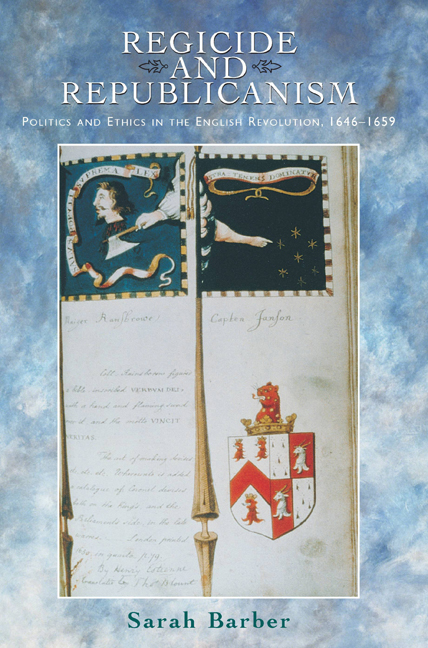Book contents
- Frontmatter
- Contents
- Preface
- List of Abbreviations
- Introduction: Regicide and Republicanism
- 1 Unparliamentary Language and the Dignity of the Crown
- 2 ‘A Mere Man’: Charles Levelled
- 3 The Expense of Blood and Treasure
- 4 King Ahab
- 5 Queen Justice
- 6 Government New Modelled?
- 7 The Engagement of Loyalty
- 8 The Active and the Passive Life
- Epilogue: The Good Old Cause
- Select Bibliography of Printed Sources
- Index
6 - Government New Modelled?
Published online by Cambridge University Press: 03 October 2020
- Frontmatter
- Contents
- Preface
- List of Abbreviations
- Introduction: Regicide and Republicanism
- 1 Unparliamentary Language and the Dignity of the Crown
- 2 ‘A Mere Man’: Charles Levelled
- 3 The Expense of Blood and Treasure
- 4 King Ahab
- 5 Queen Justice
- 6 Government New Modelled?
- 7 The Engagement of Loyalty
- 8 The Active and the Passive Life
- Epilogue: The Good Old Cause
- Select Bibliography of Printed Sources
- Index
Summary
For a government built on such shaky foundations, the child of a purge, a trial and an execution, it was both imperative and difficult to establish its ideological and institutional identity. There was little agreement about what constituted a framework for republican government, either among members of the Rump parliament itself or in its wider constitutency of supporters who, over the course of the government's first months, preferred their views of the way forward. The government and its supporters were, at their own admission, ‘an Heterogenial Body, consisting of parts very diverse from one another, seded upon principles inconsistent one with another’. A number of issues which arose in the early months of the Commonwealth forced the Rumpers to tackle the conceptual difficulties of definition: the status of the Rump parliament itself; the possible need for an executive committee to manage day-to- day affairs; the status of the army; the future of the aristocracy; and a possible oath of loyalty to the new form of government. The numerous ideas which were put forward did, however, naturally divide into two approaches. There were those who hoped that the ship of state would not be blown about too wildly and those who expected to explore brave new spiritual or civil worlds.
Royalists sneered that the new republic was an unworkable fiction of the Independents’ imagination. After the Restoration, Samuel Buder was free to deride the republicans for having invented fanciful, utopian models for government.Those who tried to aid the government by distributing their own plans for governmental reform, were careful to stress their practicability. Theophilus P. published his recipe for the reform of the electoral system. His prescription hinted at another purge, because Pride's Purge had only moved the malignants and not completely ejected them from the system. In the language of the herbalist whose rhubarb and senna scoured the innards of the human body, Theophilus continued with the metaphor of the body politic. ‘I have sent you by her poor servant Theophilus’, he declared, ‘such Samples as grow in her own garden; they be no Drugs from Eutopia, or the new Atlantis, they may be of use.’ J. Philolaus was equally sceptical of the possibility of a utopia. The urgency of reforming a real state left no time for the abstractions of More and Bacon.
- Type
- Chapter
- Information
- Regicide and RepublicanismPolitics and Ethics in the English Revolution, 1646–1659, pp. 147 - 173Publisher: Edinburgh University PressPrint publication year: 2020

